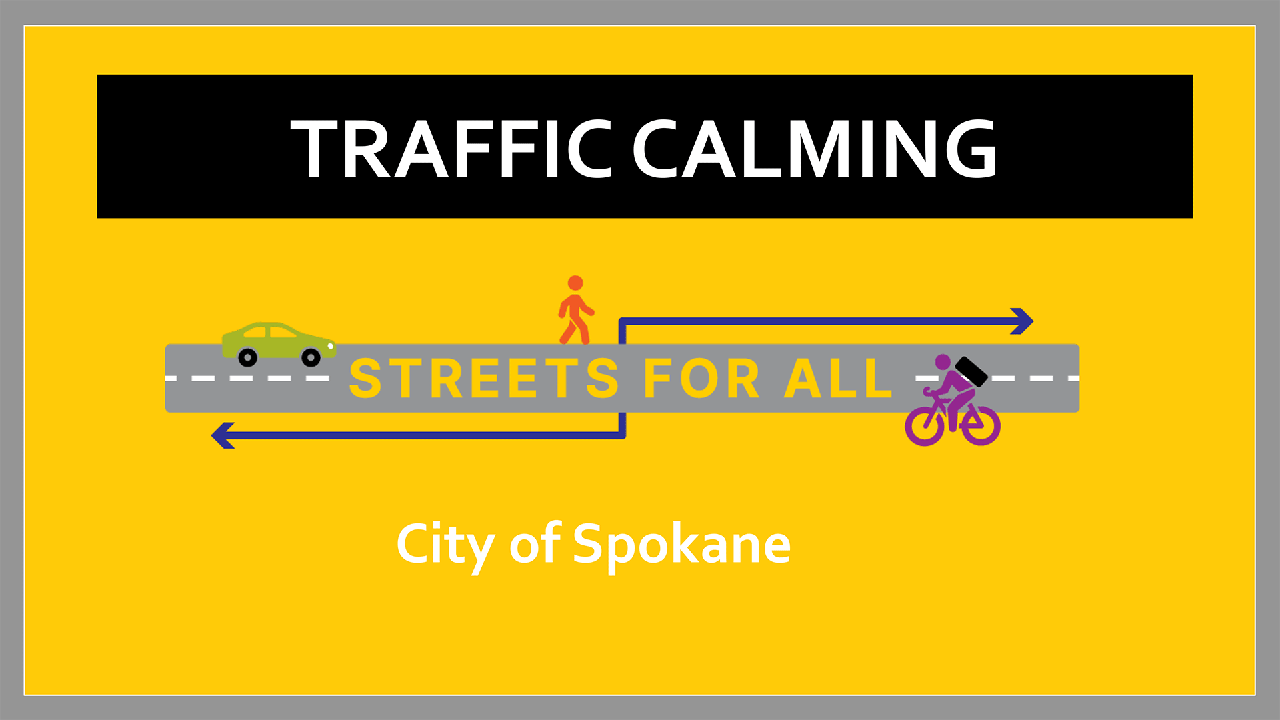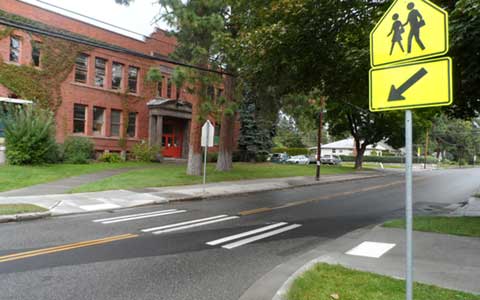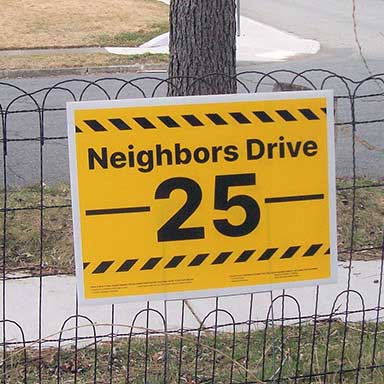Spokane Safe Streets for All (Traffic Calming)
The goal of the Spokane Safe Streets for All (Traffic Calming) program is to make our City neighborhoods more livable and safe for all users. The program formed in 2010 and allowed each neighborhood to apply for one or two projects annually to mitigate traffic issues and suggest a preferred solution. Sometimes the preferred solution was not something the traffic engineers would recommend, and it created some discourse. Additionally, having yearly applications was a lot of work and often project construction was delayed, so City staff and City Council decided a new process to identify and prioritize projects was needed.
Cycle 14 was selected for Adaptive Design in 2026, Permanent projects for 2027, and bicycle enhancements.
Funding for the Safe Streets for All (Traffic Calming) program comes from speed and photo red cameras.
Next Cycle
You can now submit a project location for consideration in the next cycle using the online survey, available below.
What is Traffic Calming?

According to the Institute of Transportation Engineers (ITE), the definition of traffic calming is “the combination of mainly physical measures that reduce the negative effects of motor vehicle use, alter driver behavior, and improve conditions for non-motorized street users.”
By design, traffic calming is a self-enforcing traffic management approach that forces motorists to alter their speed or direction of travel. The purpose of traffic calming is to improve safety, especially for pedestrians and bicyclists, and to improve the environment or “livability” of streets for residents and visitors. By decreasing volume and/or reducing speed the number and severity of accidents can be greatly diminished.
Traffic Calming techniques may include education, enforcement, or engineering to shift traffic patterns and/or reduce speeds. Most traffic calming measures focus on engineering changes to alter driver behavior. Traffic Calming techniques may include physical changes such as roadway narrowing, traffic circles, pavement markings, signage and others. Education and enforcement efforts should be considered prior to engineering alternatives and as a complement to engineering efforts.
Traffic Calming Map
The Traffic Calming map displays all the projects that have been completed through the Traffic Calming Program. When you click/tap on circles or the lines on the map information about the project type, construction year, neighborhood and City Council District will show up. Have fun exploring the variety of traffic calming projects that have been built by application from the neighborhood councils.
Why is Traffic Calming Important

- Improves neighborhood safety and livability
- Advances equity by improving access to transportation for all
- Enhances sustainability by reducing vehicle miles traveled
- Encourages Smart Growth
- Increases economic competitiveness for our community
- Builds collaboration between government and community
- Improves health by improving bike and pedestrian facilities
Traffic Calming Education

Education is one of the three "E's" of Traffic Calming in addition to Engineering and Enforcement. The goal of traffic calming education is to both inform drivers that they are travelling on neighborhood streets. Our current campaign "Neighbors Drive 25" reminds people to slow down as they travel through neighborhoods. If you are interested in placing one of the signs in your yard, please reach out to your neighborhood council chair or pick one up on the first floor of City Hall!
NOTE: If you are concerned with speeding in your area, contact the Spokane Police Department's Traffic Unit Hotline (509.625.4150). If there is property or vehicle damage, contact Spokane County's Crime Check (509.456.2233).
Contact Information
Abbey Martin
ammartin@spokanecity.org
509.625.6426
Citywide Traffic Calming Plan
Final Report
- Traffic Calming Summary Report (PDF 1.6 MB)
- Appendix 1 – Traffic Analyses (PDF 17.4 MB)
- Appendix 2 – Concept Designs (PDF 68.7 MB)
- Appendix 3 – Cost Estimates (PDF 3 MB)
- Appendix 4 – Issues Workshops Photolog (PDF 45.6 MB)
- Appendix 5 – Concept Solutions Workshops Photolog (PDF 994 KB)
Workshop #2 – Solutions
District 1
- Bemiss Traffic Solutions (PDF 5.4 MB)
- Chief Garry Park Traffic Solutions (PDF 5.0 MB)
- Hillyard Traffic Solutions (PDF 2.3 MB)
- Logan Traffic Solutions (PDF 3.4 MB)
- Minnehaha Traffic Solutions (PDF 5.5 MB)
- Nevada Heights Traffic Solutions (PDF 3.4 MB)
- Riverside Traffic Solutions (PDF 1.1 MB)
- Shiloh Hills Traffic Solutions (PDF 2.9 MB)
- Whitman Traffic Solutions (PDF 7.7 MB)
District 2
- Cliff Cannon Traffic Solutions (PDF 13.7 MB)
- Comstock Traffic Solutions (PDF 17.8 MB)
- East Central Traffic Solutions (PDF 2.5 MB)
- Grandview Thorpe Traffic Solutions (PDF 17.6 MB)
- Latah Hangman Traffic Solutions (PDF 17.7 MB)
- Lincoln Heights Traffic Solutions (PDF 15.9 MB)
- Manito Cannon Hill Traffic Solutions (PDF 20.0 MB)
- Rockwood Traffic Solutions (PDF 8.4 MB)
- Southgate Traffic Solutions (PDF 9.0 MB)
- West Hills Traffic Solutions (PDF 14.2 MB)
District 3
- Audubon Downriver Traffic Solutions (PDF 6.6 MB)
- Balboa South Indian Train Traffic Solutions (PDF 11.1 MB)
- Browne's Addition Traffic Solutions (PDF 20.8 MB)
- Emerson Garfield Traffic Solutions (PDF 4.0 MB)
- Five Mile Prairie Traffic Solutions (PDF 4.3 MB)
- North Hill Traffic Solutions (PDF 13.1 MB)
- North Indian Trail Traffic Solutions (PDF 2.8 MB)
- Northwest Traffic Solutions (PDF 15.4 MB)
- Peaceful Valley Traffic Solutions (PDF 16.1 MB)
- West Central Traffic Solutions (PDF 4.6 MB)
Workshop #1 – Concerns
- District 1 Neighborhood Traffic Concerns Memo (PDF 3.5 MB)
- District 2 Neighborhood Traffic Concerns Memo (PDF 4.4 MB)
- District 3 Neighborhood Traffic Concerns Memo (PDF 3.2 MB)
- District 1 Kick-off Meeting Notes (PDF 153 KB)
- District 2 Kick-off Meeting Notes (PDF 139 KB)
- District 3 Kick-off Meeting Notes (PDF 150 KB)
- Citywide Kick-off Meeting Notes (PDF 191 KB)
Special Traffic Calming Studies
- Altamont Loop
- Traffic Study (PDF 1.8 MB)
- Improvement Recommendations (PDF 1.6 MB)
- Indian Trail
- Traffic Study (PDF 5.3 MB)
- Improvement Recommendations (coming soon)
Traffic Calming Project Cycles
- Cycle 14 Traffic Calming Projects (PDF 8.2 MB)
- Cycle 13 Traffic Calming Projects (PDF 16.8 MB)
- Cycle 12 Traffic Calming Projects (PDF 71 KB)
- Cycle 11 Traffic Calming Projects (PDF 111 KB)
- Cycle 10 Neighborhood Traffic Calming Projects (PDF 111 KB)
- Cycle 9 Neighborhood Traffic Calming Projects (PDF 106 KB)
- 2019 School Safety Traffic Calming Projects (PDF 101 KB)
- 2018 School Safety Program Projects and Construction Dates (PDF 443 KB)
- Cycle 5 & 6 Traffic Calming Projects and Construction Dates (PDF 597 KB)
- Cycle 7 Traffic Calming Projects and Construction Dates (PDF 106 KB)
- Cycle 8 Traffic Calming Projects and Construction Dates (PDF 438 KB)
- PED Handbook Summary (PDF 1.9 MB)
- Photo Red Light Camera Presentation (PDF 1.4 MB)
